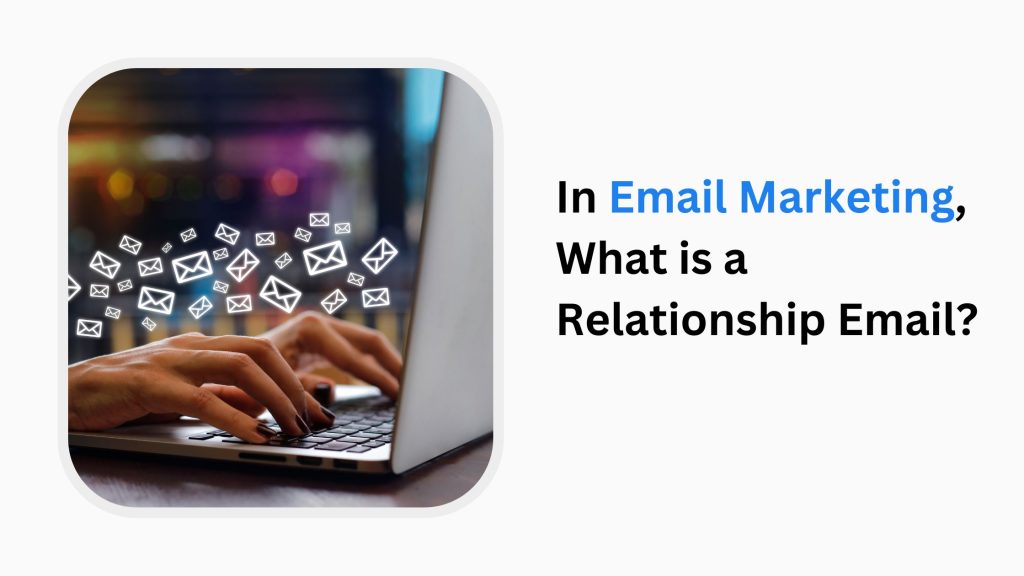
In Email Marketing, What is a Relationship Email?
Email marketing plays a pivotal role in establishing and nurturing customer relationships. It is a powerful tool that allows businesses to connect with their audience, communicate effectively, and build trust. Within the realm of email marketing, one particular type of email stands out for its ability to foster engagement and loyalty – the relationship email.
What is Relationship Emails?
Relationship emails are a fundamental component of successful email marketing campaigns. These emails are designed to cultivate and strengthen the bond between businesses and their customers. Unlike promotional or transactional emails, relationship emails focus on building long-term connections rather than immediate sales. They are aimed at fostering trust, establishing credibility, and creating a meaningful dialogue with recipients.
Relationship emails stand apart due to their unique purpose and characteristics. Their primary goal is not solely transactional but rather to engage customers, provide value, and encourage interaction. By nurturing relationships through personalized and targeted communication, businesses can create a positive impact on their customers’ journey.
Key Elements of a Relationship Email
Personalization: One of the key elements of a relationship email is personalization. By tailoring the content and message to individual recipients, businesses can create a sense of relevance and make the recipient feel valued. Personalization can involve using the recipient’s name, referencing their previous interactions, or segmenting the email list based on specific customer preferences.
Relevant and Valuable Content: Relationship emails should provide useful information and address the needs and pain points of the recipients. By offering valuable content such as tips, insights, or exclusive offers, businesses can establish themselves as a trusted source of information and build credibility with their audience.
Timeliness: Sending relationship emails at the right moment is crucial for maximum impact. Timing can be based on various factors such as recent customer activities, milestones, or seasonal events. By sending emails when customers are most receptive, businesses can increase the chances of engagement and response.
Two-Way Communication: Relationship emails are not one-sided monologues; they aim to foster two-way communication. Encouraging recipients to interact, reply, or provide feedback enables businesses to establish a genuine connection with their audience. It opens up avenues for dialogue and allows businesses to understand their customers better.
Benefits of Using Relationship Emails
Relationship emails offer a range of benefits that contribute to the overall success of email marketing campaigns.
Enhanced Customer Engagement: Relationship emails are designed to encourage active participation from recipients. By providing valuable content and promoting interactive elements such as surveys, polls, or social media engagement, businesses can foster a higher level of engagement from their customers.
Improved Customer Loyalty: Relationship emails are instrumental in building long-term relationships and increasing customer loyalty. By consistently delivering valuable content and personalized experiences, businesses can nurture a sense of trust and loyalty among their audience, leading to repeat purchases and brand advocacy.
Higher Conversion Rates: Relationship emails have the potential to drive higher conversion rates compared to other types of emails. When customers feel a strong connection with a brand, they are more likely to convert and make a purchase. By leveraging relationship emails to showcase products or services that align with the recipient’s preferences and needs, businesses can increase their conversion rates.
Positive Brand Perception: Relationship emails contribute significantly to shaping a positive brand perception. When businesses consistently provide value, address customer needs, and engage in meaningful communication, they establish themselves as trusted authorities in their respective industries. This, in turn, enhances the overall brand reputation and fosters customer loyalty.
Strategies for Creating Effective Relationship Emails
Creating effective relationship emails requires careful planning and implementation. Here are some strategies to consider:
Building a Quality Email List: Focus on attracting and retaining engaged subscribers who are genuinely interested in your brand and offerings. Offer incentives such as exclusive content, discounts, or giveaways to encourage sign-ups and ensure the quality of your email list.
Crafting Compelling Subject Lines: Write attention-grabbing subject lines that entice recipients to open your emails. Incorporate relevant keywords and consider personalization to increase open rates.
Personalization Techniques: Utilize recipient data to personalize your relationship emails. This can include addressing recipients by name, referencing their previous purchases or interactions, or tailoring content based on their preferences.
Testing and Optimization: A/B testing is essential to optimize the performance of your relationship email campaigns. Experiment with different subject lines, content formats, and calls to action to identify what resonates best with your audience.
Conclusion
Relationship emails are a powerful tool within the realm of email marketing. By leveraging personalization, valuable content, timely communication, and two-way interaction, businesses can establish and nurture long-term relationships with their customers.
Implementing effective relationship email strategies can lead to enhanced customer engagement, improved loyalty, higher conversion rates, and a positive brand perception.
Don’t miss out on the opportunities that relationship emails offer. Start building meaningful connections with your audience and watch your email marketing efforts flourish.
Additional Resources for Relationship Emails
If you’re looking to delve deeper into the world of relationship emails and email marketing best practices, check out the following resources:
- “The Ultimate Guide to Relationship Emails” by Email Marketing Experts.
- “Email Personalization: The Key to Successful Relationship Marketing“.
- “Optimizing Email Campaigns for Maximum Engagement” – Webinar by Email Marketing Association.
These resources provide valuable insights, tips, and techniques to help you optimize your relationship email campaigns and achieve exceptional results.
FAQs of Relationship Emails
Can relationship emails be automated?
Yes, relationship emails can be automated using email marketing software. This allows businesses to send personalized emails at scale and nurture relationships efficiently.
How often should I send relationship emails?
The frequency of relationship emails depends on your specific audience and industry. Aim for a balance between staying top-of-mind and avoiding email fatigue. Monitor engagement metrics and adjust the frequency accordingly.
Are relationship emails suitable for all businesses?
Yes, relationship emails are valuable for businesses across various industries. Regardless of your niche, establishing meaningful connections and nurturing customer relationships can contribute to your long-term success.
How can I measure the success of my relationship email campaigns?
Key metrics to track include open rates, click-through rates, conversion rates, and customer engagement levels. Monitor these metrics regularly and make data-driven adjustments to optimize your campaigns.
Can relationship emails help with customer retention?
Absolutely! Relationship emails play a significant role in customer retention by fostering loyalty and engagement. By consistently delivering value and personalized experiences, businesses can increase customer retention rates.
Remember, relationship emails are a powerful tool in email marketing. Embrace their potential and craft engaging, personalized emails to cultivate strong and lasting connections with your customers









Write A Comment